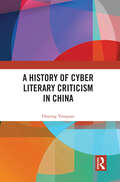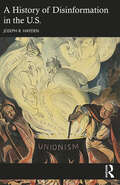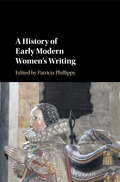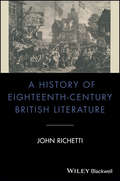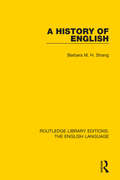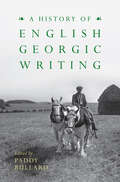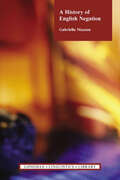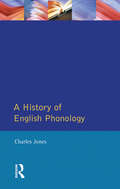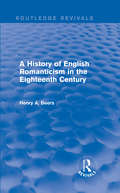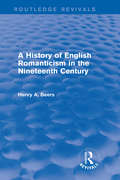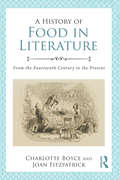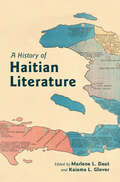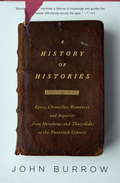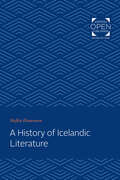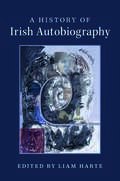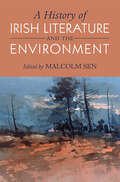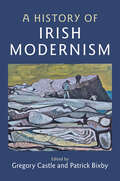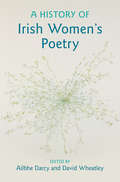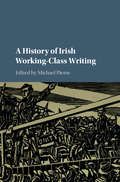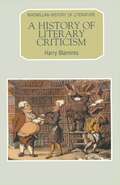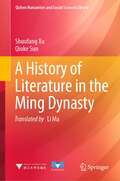- Table View
- List View
A History of Communications
by Marshall T. PoeA History of Communications advances a new theory of media that explains the origins and impact of different forms of communication – speech, writing, print, electronic devices and the Internet – on human history in the long term. New media are 'pulled' into widespread use by broad historical trends and these media, once in widespread use, 'push' social institutions and beliefs in predictable directions. This view allows us to see for the first time what is truly new about the Internet, what is not, and where it is taking us.
A History of Cyber Literary Criticism in China
by Ouyang YouquanThis is the first scholarly attempt to write a history of cyber literary criticism in China. The author uses the Internet as the departure point, literature as the horizontal axis, and criticism as the vertical axis, to draw a detailed trajectory of the development of cyber literary criticism in China.The book comprises two parts. The first part focuses on the representation of historical facts about cyber literary criticism, covering five topics: the evolution of cyber literary criticism in the context of the new media; major types of cyber literary critics and their criticism; academic achievements in cyber literary studies; the form, contents, and rhetorical expressions of so-called netizens’ critical commentaries; and important events in the history of cyber literary criticism. The second part discusses the historical changes in literary criticism as responses to cyber literature, covering another five topics: the conceptual transformation in literary criticism of the Internet era; the establishment of evaluation criteria for cyber literature; changes in the function of cyber literary criticism; changes in the constitution of cyber literary critics; and the impact of cyber literary criticism. This book will be an essential read to students and scholars of East Asian Studies, literary criticism, and those who are interested in cyber literature in general.
A History of Disinformation in the U.S.
by Joseph R. HaydenThis volume recounts notable episodes of distortion throughout American media history. It examines several of the lurid hoaxes and conspiracy theories that have inspired press coverage, as well as some of the political lies promoted by partisan gladiators, whether of the eighteenth century or today.The book moves beyond the sensational stories to show the enduring and systemic nature of media manipulation that occurs on far more consequential issues. It exposes persistent and deeply destructive falsehoods that have been told about women, people of color, immigrants, the LGBTQ+ community, unions, commercial products, highlighting how longstanding “bipartisan” myths have effectively marginalized certain groups of Americans. Alongside these cases, the author carefully dissects the changing nature of institutions, technologies, and practices of journalism in America. Attention is given to the evolution of newspapers in the eighteenth and nineteenth centuries, the role of broadcasting in the twentieth, and the impact of the internet and social media at the dawn of the twenty-first.This book will appeal to readers interested in American history, journalism, communication studies, political science and sociology.
A History of Early Modern Women's Writing
by Patricia PhillippyA History of Early Modern Women's Writing is essential reading for students and scholars working in the field of early modern British literature and history. This collaborative book of twenty-two chapters offers an expansive, multifaceted narrative of British women's literary and textual production in the period stretching from the English Reformation to the Restoration. Chapters work together to trace the contours of a diverse body of early modern women's writing, aligning women's texts with the major literary, political, and cultural currents with which they engage. Contributors examine and take account of developments in critical theory, feminism, and gender studies that have influenced the reception, reading, and interpretation of early modern women's writing. This book explicates and interrogates significant methodological and critical developments in the past four decades, guiding and testing scholarship in this period of intense activity in the recovery, dissemination, and interpretation of women's writing.
A History of Eighteenth-Century British Literature
by John RichettiA History of Eighteenth-Century British Literature is a lively exploration of one of the most diverse and innovative periods in literary history. Capturing the richness and excitement of the era, this book provides extensive coverage of major authors, poets, dramatists, and journalists of the period, such as Dryden, Pope and Swift, while also exploring the works of important writers who have received less attention by modern scholars, such as Matthew Prior and Charles Churchill. Uniquely, the book also discusses noncanonical, working-class writers and demotic works of the era. During the eighteenth-century, Britain experienced vast social, political, economic, and existential changes, greatly influencing the literary world. The major forms of verse, poetry, fiction and non-fiction, experimental works, drama, and political prose from writers such as Montagu, Finch, Johnson, Goldsmith and Cowper, are discussed here in relation to their historical context. A History of Eighteenth-Century British Literature is essential reading for advanced undergraduates and graduate students of English literature. Topics covered include: Verse in the early 18th century, from Pope, Gay, and Swift to Addison, Defoe, Montagu, and Finch Poetry from the mid- to late-century, highlighting the works of Johnson, Gray, Collins, Smart, Goldsmith, and Cowper among others, as well as women and working-class poets Prose Fiction in the early and 18th century, including Behn, Haywood, Defoe, Swift, Richardson, Fielding, and Smollett The novel past mid-century, including experimental works by Johnson, Sterne, Mackenzie, Walpole, Goldsmith, and Burney Non-fiction prose, including political and polemical prose 18th century drama
A History of English (Routledge Library Editions: The English Language #26)
by Barbara M. StrangA History of English, first published in 1970, is a book for beginners in linguistic history. This title examines the changes in English language speech and writing over a period of almost 2000 years, whilst also exploring more recent changes within the author’s living memory. This title aims to raise countless issues for enquiry and discussion, and its purpose is to serve as a springboard for language history learning rather than a textbook.
A History of English Autobiography
by Adam SmythA History of English Autobiography explores the genealogy of autobiographical writing in England from the medieval period to the digital era. Beginning with an extensive introduction that charts important theoretical contributions to the field, this History includes wide-ranging essays that illuminate the legacy of English autobiography. Organized thematically, these essays survey the multilayered writings of such diverse authors as Chaucer, Bunyan, Carlyle, Newman, Wilde and Woolf. Written by a host of leading scholars, this History is the definitive, single-volume collection on English autobiography and will serve as an invaluable reference for specialists and students alike.
A History of English Georgic Writing
by Paddy BullardThe interconnected themes of land and labour were a common recourse for English literary writers between the sixteenth and twentieth centuries, and in the twenty-first they have become pressing again in the work of nature writers, environmentalists, poets, novelists and dramatists. Written by a team of sixteen subject specialists, this volume surveys the literature of rural working lives and landscapes written in English between 1500 and the present day, offering a range of scholarly perspectives on the georgic tradition, with insights from literary criticism, historical scholarship, classics, post-colonial studies, rural studies and ecocriticism. Providing an overview of the current scholarship in georgic literature and criticism, this collection argues that the work of people and animals in farming communities, and the land as it is understood through that work, has provided writers in English with one of their most complex and enduring themes.
A History of English Negation (Longman Linguistics Library)
by Gabriella MazzonNegation is one of the main functions in human communication.A History of English Negation is the first book to analyse English negation over the whole of its documented history, using a wide database and accessible terminology. After an introductory chapter, the book analyses evidence from the whole sample of Old English documents available, and from several Middle English and Renaissance documents, showing that the range of forms used at any single stage is wider, and the pace of their change considerably faster, than previously commonly assumed. The book moves on to review current formalised accounts of the situation in Modern English, tracing the changes in rules for expressing negation that have intervened since the earliest documented history of the language. Since the standard is only one variety of a language, it also surveys the means of negation used in some non-standard and dialectal varieties of English. The book concludes with a look at relatively recently born languages such as Pidgins and Creoles, to investigate the degree of naturalness of the principles that rule the expression of English negation.
A History of English Phonology (Longman Linguistics Library)
by Charles JonesThis is an attempt to view historical phonological change as an ongoing, recurrent process. The author sees like events occurring at all periods, a phenomenon which he considers is disguised by too great a reliance upon certain characteristics of the scholarly tradition. Thus he argues that those innovations arrived at by speakers of the English language many years ago are not in principle unlike those that can be seen to be happening today. Phonological mutations are, on the whole, not to be regarded as unique, novel, once only events. Speakers appear to present to speech sound materials, a limited set of evaluative and decoding perceptions, together with what would seem to be a finite number of innovation producing stratagems in response to their interpretation. It is stressed that this interpretation may itself be a direct product of the kinds of data selected for presentation in traditional handbooks and Jones notes the fact that phonological change is often "messy" and responsive to a highly tuned ability to perceive fine phonetic detail of a type which, by definition, rarely has the opportunity to surface in historical data sources.
A History of English Romanticism in the Eighteenth Century (Routledge Revivals)
by Henry A. BeersFirst published in 1926, this title presents the great artistic and literary innovations of the Romantic movement according to an often overlooked and unacknowledged definition of ‘Romanticism’, which is of particular relevance in the consideration of the English Romantic spirit: pertaining to the style of the Christian and popular literature of the Middle Ages.
A History of English Romanticism in the Nineteenth Century (Routledge Revivals)
by Henry A. BeersA History of English Romanticism in the Nineteenth Century, first published in 1926, presents the great artistic and literary innovations of the Romantic movement according to an often overlooked and unacknowledged definition of ‘Romanticism’, which is of particular relevance in the consideration of the English Romantic spirit: pertaining to the style of the Christian and popular literature of the Middle Ages. The author recapitulates the key contributions of English poets – including Scott, Coleridge and Keats - in light of their recovery of certain themes and leitmotifs that clearly distinguish the Romantic style. In addition, the development of the Romantic movement in France and Germany is given some attention, and the specific tendencies of their respective approaches is considered in relation to England. The emergence of the Pre-Raphaelites is investigated, and a tentative evaluation of the progress of English Romanticism in the nineteenth century is offered.
A History of Food in Literature: From the Fourteenth Century to the Present
by Charlotte Boyce Joan FitzpatrickWhen novels, plays and poems refer to food, they are often doing much more than we might think. Recent critical thinking suggests that depictions of food in literary works can help to explain the complex relationship between the body, subjectivity and social structures. A History of Food in Literature provides a clear and comprehensive overview of significant episodes of food and its consumption in major canonical literary works from the medieval period to the twenty-first century. This volume contextualises these works with reference to pertinent historical and cultural materials such as cookery books, diaries and guides to good health, in order to engage with the critical debate on food and literature and how ideas of food have developed over the centuries. Organised chronologically and examining certain key writers from every period, including Chaucer, Shakespeare, Austen and Dickens, this book's enlightening critical analysis makes it relevant for anyone interested in the study of food and literature.
A History of German Literature: From the Beginnings to the Present Day
by Peter Stein Volker Meid Bernd Lutz Wolfgang Beutin Klaus Ehlert Wolfgang Emmerich Helmut Hoffacker Ralf Schnell Inge StephanSince the appearance of its first edition in Germany in 1979, A History of German Literature has established itself as a classic work used by students and anyone interested in German literature. The volume chronologically traces the development of German literature from the Middle Ages to the present day. Throughout this chronology, literary developments are set in a social and political context. This includes a final chapter, written for this latest edition, on the consequences of the reunification of Germany in 1990. Thoroughly interdiscipinary in method, the work also reflects recent developments in literary criticism and history. Highly readable and stimulating, A History of German Literature succeeds in making the literature of the past as immediate and engaging as the works of the present. It is both a scholary study and an invaluable reference work for students.
A History of Haitian Literature
by Kaiama L. Glover Marlene L. DautFrom nineteenth-century antislavery pamphleteering to accounts of ecological catastrophe in twenty-first-century fiction, Haitian literature has resounded across the globe since the nation's revolutionaries declared independence in 1804. Starting with pre-revolutionary writing, including the emergence of Haitian Creole letters, extending to the long, largely francophone nineteenth century, and concluding with present-day Haitian writing in the English language, A History of Haitian Literature presents the political, cultural, and historical frameworks necessary to comprehend Haiti's vast literary output. Whether writing in Haiti or its wide-ranging diasporas, Haitian authors have boldly contributed to pressing conversations in global letters while reflecting Haiti's unique cultural and historical experiences. Considering an expansive array of poets, playwrights, and novelists – such as Baron de Vastey, Juste Chanlatte, Demesvar Delorme, Edwidge Danticat, René Depestre, Kettly Mars, Dany Laferrière, and Évelyne Trouillot – the contributors to this volume offer a fresh examination of a richly polyglot, transnational literary tradition that spans more than two centuries.
A History of Histories: Epics, Chronicles, and Inquiries from Herodotus and Thucydides to the Twentieth Century
by J. W. BurrowTreating the practice of history not as an isolated pursuit but as an aspect of human society and an essential part of the culture of the West, John Burrow magnificently brings to life and explains the distinctive qualities found in the work of historians from the ancient Egyptians and Greeks to the present. With a light step and graceful narrative, he gathers together over 2,500 years of the moments and decisions that have helped create Western identity. This unique approach is an incredible lens with which to view the past. Standing alone in its ambition, scale and fascination, Burrow's history of history is certain to stand the test of time.
A History of Icelandic Literature
by Stefán EinarssonOriginally published in 1957. Stefán Einarsson covers almost a thousand years of Icelandic literature in tracing the influence of the sagas and eddic poems. The book begins with background on Icelandic literature, outlining its literary roots in Scandinavia. Following this, Einarsson provides a thorough survey of Icelandic literature through the 1950s.
A History of Indian Poetry in English
by Rosinka ChaudhuriA History of Indian Poetry in English explores the genealogy of Anglophone verse in India from its nineteenth-century origins to the present day. Beginning with an extensive introduction that charts important theoretical contributions to the field, this History includes extensive essays that illuminate the legacy of English in Indian poetry. Organized thematically, these essays survey the multilayered verse of such diverse poets as Henry Louis Vivian Derozio, Rabindranath Tagore, Nissim Ezekiel, Dom Moraes, Kamala Das, and Melanie Silgardo. Written by a host of leading scholars, this History also devotes special attention to the lasting significance of imperialism and diaspora in Indian poetry. This book is of pivotal importance to the development of Indian poetry in English and will serve as an invaluable reference for specialists and students alike.
A History of Irish Autobiography
by Liam HarteA History of Irish Autobiography is the first ever critical survey of autobiographical self-representation in Ireland from its recoverable beginnings to the twenty-first century. The book draws on a wealth of original scholarship by leading experts to provide an authoritative examination of autobiographical writing in the English and Irish languages. Beginning with a comprehensive overview of autobiography theory and criticism in Ireland, the History guides the reader through seventeen centuries of Irish achievement in autobiography, a category that incorporates diverse literary forms, from religious tracts and travelogues to letters, diaries, and online journals. This ambitious book is rich in insight. Chapters are structured around key subgenres, themes, texts, and practitioners, each featuring a guide to recommended further reading. The volume's extensive coverage is complemented by a detailed chronology of Irish autobiography from the fifth century to the contemporary era, the first of its kind to be published. Contains twenty-five chapters by leading scholars from around the world, providing an authoritative critical survey of different types of Irish autobiography, notable subgenres, common themes, and important texts and writers; Includes the first detailed chronology of Irish autobiography from the arrival of Christianity in the fifth century to the contemporary era; Each chapter features a guide to recommended further reading, enabling readers to build upon the concepts provided in each chapter.
A History of Irish Literature and the Environment
by Malcolm SenFrom Gaelic annals and medieval poetry to contemporary Irish literature, A History of Irish Literature and the Environment examines the connections between the Irish environment and Irish literary culture. Themes such as Ireland's island ecology, the ecological history of colonial-era plantation and deforestation, the Great Famine, cultural attitudes towards animals and towards the land, the postcolonial politics of food and energy generation, and the Covid-19 pandemic - this book shows how these factors determine not only a history of the Irish environment but also provide fresh perspectives from which to understand and analyze Irish literature. An international team of contributors provides a comprehensive analysis of Irish literature to show how the literary has always been deeply engaged with environmental questions in Ireland, a crucial new perspective in an age of climate crisis. A History of Irish Literature and the Environment reveals the socio-cultural, racial, and gendered aspects embedded in questions of the Irish environment.
A History of Irish Modernism
by Gregory Castle Patrick BixbyA History of Irish Modernism examines a wide variety of artworks (from the 1890s to the 1970s), including examples from literature, film, painting, music, radio, and architecture. Each chapter considers a particular aspect of Irish culture and reflects on its contribution to modernism at large. In addition to new research on Irish Revival and cultural nationalism, which places them squarely in the modernist arena, chapters offer transnational and transdisciplinary perspectives that place Irish cultural production in new contexts. At the same time, the historical standpoint adopted in each chapter enables our contributors to examine how modernist practices developed across geographical and temporal distances. A History of Irish Modernism thus attests to the unique development of modernism in Ireland—driven by political as well as artistic concerns—even as it embodies aesthetic principles that are the hallmark of modernism in Europe, the Americas and beyond.
A History of Irish Women's Poetry
by David Wheatley Ailbhe DarcyA History of Irish Women's Poetry is a ground-breaking and comprehensive account of Irish women's poetry from earliest times to the present day. It reads Irish women's poetry through many prisms – mythology, gender, history, the nation – and most importantly, close readings of the poetry itself. It covers major figures, such as Máire Mhac an tSaoi, Eavan Boland, Eiléan Ní Chuilleanáin, as well as neglected figures from the past. Writing in both English and Irish is considered, and close attention paid to the many different contexts in which Irish women's poetry has been produced and received, from the anonymous work of the early modern period, through the bardic age, the coterie poets of Anglo-Ireland, the nationalist balladeers of Young Ireland, the Irish Literary Revival, and the advent of modernity. As capacious as it is diverse, this book is an essential contribution to scholarship in the field.
A History of Irish Working-Class Writing
by Michael PierseA History of Irish Working-Class Writing provides a wide-ranging and authoritative chronicle of the writing of Irish working-class experience. Ground-breaking in scholarship and comprehensive in scope, it is a major intervention in Irish Studies scholarship, charting representations of Irish working-class life from eighteenth-century rhymes and songs to the novels, plays and poetry of working-class experience in contemporary Ireland. There are few narrative accounts of Irish radicalism, and even fewer that engage 'history from below'. This book provides original insights in these relatively untilled fields. Exploring workers' experiences in various literary forms, from early to late capitalism, the twenty-two chapters make this book an authoritative and substantial contribution to Irish studies and English literary studies generally.
A History of Literary Criticism
by Michael MoronyThe author traces the course of literary criticism from its foundations in classical and medieval precepts to the theorising of the present day. He explores the texts which have been milestones in the history of critical thought, placing them firmly in the context of their time.
A History of Literature in the Ming Dynasty (Qizhen Humanities and Social Sciences Library)
by Shuofang Xu Qiuke SunThis book explores poems, novels, legends, operas and other genres of writing from the Ming Dynasty. It is composed of two parts: the literary history; and comprehensive reference materials based on the compilation of several chronologies. By studying individual literary works, the book analyzes the basic laws of the development of literature during the Ming Dynasty, and explores the influences of people, time, and place on literature from a sociological perspective. In turn, it conducts a contrastive analysis of Chinese and Western literature, based on similar works from the same literary genre and their creative methods. The book also investigates the relationship between literary theory and literary creation practices, including those used at various poetry schools. In closing, it studies the unique aesthetic traits of related works. Sharing valuable insights and perspectives, the book can serve as a role model for future literary history studies. It offers a unique resource for literary researchers, reference guide for students and educators, and lively read for members of the general public.

